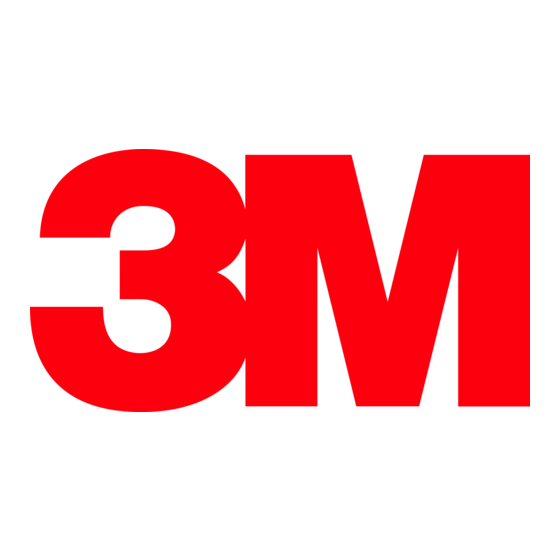3M Dynapro ET 3170 Terminal Series B Panduan Instalasi - Halaman 4
Jelajahi secara online atau unduh pdf Panduan Instalasi untuk Monitor 3M Dynapro ET 3170 Terminal Series B. 3M Dynapro ET 3170 Terminal Series B 6 halaman. Desktop stand's installation: terminal and computers
Juga untuk 3M Dynapro ET 3170 Terminal Series B: Panduan Instalasi (4 halaman), Panduan Instalasi (3 halaman), Panduan Instalasi (4 halaman), Panduan Instalasi (2 halaman)

Connecting supplied sealed fittings
1. Make a clearance hole. Clearance holes can be made
anywhere on the back of the hatch, as long as the
hatch can open and close freely on its hinges after the
cables and/or cable fittings are installed.
Note: There are three indentations on the back of the
hatch that may be used as guides when creating holes.
However, these are only guides; if you need four
holes, you will need to decide how best to space them.
For ET 350 monitors only: The number of holes
needed will depend on whether your monitor has a
KVM extender (maximum of four holes) or not (three
holes). Table B shows the clearance holes required in
each case
Table B: For ET 350 monitors only: Cable clearance
holes required for monitors without and with KVM
extender
Opening for
ET 350 monitor
this cable
without
KVM extender
Power
Serial
VGA
CAT5
Mouse
Keyboard
Important
If the diameter of the cable is close to the ranges of both the small
and large fittings shown in Table A, try running the cable through
the smaller fitting before beginning to connect the fittings. If the
cable will go through the small fitting without being forced,
3M Touch Systems recommends using that fitting.
2. The cable fitting comes loosely assembled.
Disassemble the cable fitting into its four
components: locking nut, o-ring, body hex (which
encloses the compression sleeve), and sealing nut.
ET 350 monitor with
KVM extender
!
!
!
!
!
!
!
3M Touch Systems Proprietary Information
3. Install the o-ring onto the surface of the body hex and
then insert the body hex (with o-ring attached) into
the clearance hole on the outside of the hatch.
4. On the inside of the hatch, attach the locking nut to
the body hex.
5. Holding the body hex stationary with a wrench, hand-
tighten the locking nut and then use a second wrench
to tighten the locking nut until the cable fitting is held
in place securely (see Table A for suggested torque
values).
6. Slide the sealing nut onto the cable and then, from the
outside of the hatch, feed the cable through the cable
fitting.
7. Gently screw the sealing nut onto the body hex, but do
not tighten it. Leave the sealing nut loose to allow the
cable to move through the fitting.
8. Slide the cable through the body hex and into the
hatch until you are satisfied with the amount of cable
inside and outside of the hatch.
Make sure there is enough slack in the cable to allow
the hatch to fully open and close on its hinges without
straining the cables or connectors.
9. Holding the body hex stationary with a wrench, hand-
tighten the sealing nut and then use a second wrench
to tighten the sealing nut until the wire is held
securely in place (see Table A for suggested torque
values).
4
Installing the NEMA 4X Hatch
